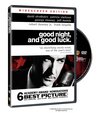Day 63: "Good Night, and Good Luck"

Director: George Clooney 2005
I really wanted to like this movie. I'd heard many good things from critics and friends, plus I'd lately found myself a prisoner of some strange phantom zone of bad 1930's films. I needed a good movie. But "Good Night, and Good Luck" was a major disappointment. I've always admired Edward R. Murrow (obviously I missed his live radio broadcasts from war-ravaged London, and I was too young for his "See It Now" programs, although I have a vague memory of his lighter "Person to Person" shows, and I am old enough to remember his classic report on migrant workers, "Harvest of Shame"). My parents held Murrow in awe, and with good reason: he was a reporter of great eloquence and integrity. But he was also a human being, something this film never addresses. "Good Night, and Good Luck" simply never comes alive, so embalmed is it on its own somberness and sense of nobility. David Strathairn's performance is fine (as are all the actors), but I never got away from the feeling that he was doing anything more than an excellent impersonation. Compare that with Philip Seymour Hoffman's Truman Capote, a performance of great sublety that always seems real and alive.
A friend told me he thought the movie--with all its black-and-white close-ups (obviously dictated by budget)--seemed like an episode of "The Twilight Zone." He's right. At any moment, I could see Rod Serling walking through all that cigarette smoke and talking in a voice almost as distinctive as Murrow's.
If you want to learn more about Murrow, get a copy of A.M. Sperber's "Murrow: His Life and Times" (1986).






